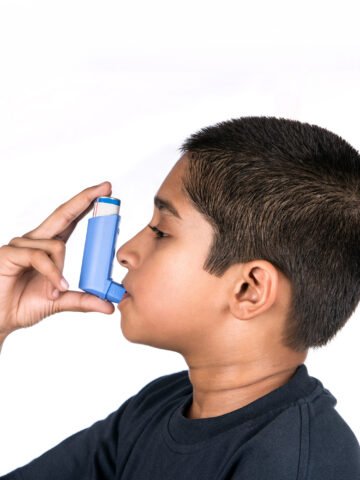A large-scale national study conducted by a CHOC team and recently published in a leading pediatrics journal concludes that COVID-19 infections in newborns, though rare, may result in severe disease.
The study, one of the first of its kind to examine neonatal COVID-19 data that up to now has been limited, appeared in prepublication form in the online version of Pediatrics, the official journal of the American Academy of Pediatrics, on Aug. 23, 2022.
The final version of the study, “Epidemiology and Clinical Presentation of Neonatal COVID-19 in the United States,” was published on Sept. 15, 2022.
A key finding of the study, based on an analysis of more than 1 million neonatal encounters at 109 health systems from March 1, 2020, to Feb. 28, 2021, was that most newborns infected with COVID-19 were asymptomatic or developed mild illness without the need for respiratory support.
The study turned up 91.1 neonatal COVID-19 cases per 100,000 hospital encounters, or 0.1%. Of these cases, 7.7% had severe infection. Most newborns with severe COVID-19 were male (55%).
One newborn (0.1%) with symptoms suggestive of Multisystem Inflammatory Syndrome in Children (MIS-C) died after 11 days of hospitalization, the study of neonates (those 28 days or younger) found.
“Even though we know severe COVID infections in children, especially in newborns, are rare, they do occur, and if just one newborn were to die of severe COVID, or a complexity associated with COVID such as MIS-C, that is one child too many,” said Louis Ehwerhemuepha, PhD, who leads the research data science program at CHOC.
“We should dedicate resources to understanding better what happens in newborns who contract COVID-19,” added Ehwerhemuepha, who initiated, conceptualized, and designed the study and was its lead author.
Also conceptualizing and designing the study was Joan Devin, who spent five months at CHOC last year as a recipient of a Fulbright-Enterprise Ireland Student Award.
Devin, first author of the study, conducted the research in CHOC’s data science department during the fourth year of her PhD program at the Royal College of Surgeons in Ireland, School of Pharmacy and Biomolecular Sciences.
“It was great to focus on this cohort since newborn care is integral to midwifery,” said Devin, a midwife and researcher at The Rotunda Hospital in Dublin. “The whole goal as a midwife is to deliver care to a newborn and mother and have them be as happy and healthy as possible, so it was a privilege to work with Louis and his team on this study.”
Other CHOC clinicians who worked on the research were pediatric hospitalist Dr. Rachel Marano, neonatologist Dr. Michel Mikhael, Chief Health Information Officer Dr. William Feaster, and Chief Scientific Officer Dr. Terence Sanger.
A vacuum of data on COVID-19 infections in newborns
The rate of COVID-19 infection in newborns is lower than in the adult and pediatric populations, possibly due to inherent protective factors such as a strong immune system, according to the study, which was supported by a Chief Scientific Officer grant at CHOC.
The idea to conduct the study came after researchers realized little had been published on the topic.
“We looked at the literature and realized that not much had been published on newborns, and what had been published was from one single pediatric healthcare center,” said Ehwerhemuepha, who also worked on a recent CHOC study that concluded that COVID-19 infection may worsen asthma in children.
“We wanted to get the big picture,” he added. “How are newborns impacted? What is the rate of severe COVID-19 in neonates, and do we have potentially morbid outcomes even though they may be rare? These are the very basic questions the study was designed to answer.”
Of the neonates who had severe COVID, almost half of them had comorbidities, the most prevalent being a congenital abnormality, the study found.
“We need more studies to see if there is a causal relationship between these comorbidities and COVID-19,” Ehwerhemuepha noted.
The study also found that nearly half of the newborns who had COVID-19 acquired it from being in the hospital, as opposed to from an infected mother.
This was not a surprise, the study’s authors said, since many of these sick babies had been born prematurely and had spent a lot of time in the NICU.
The CHOC team that worked on the study hopes to do more related ones.
“We need to learn more about what’s going on in newborns and dedicate research dollars to understanding COVID-19 in newborns,” Ehwerhemuepha said.

Learn about pediatric research and clinical trials at CHOC




